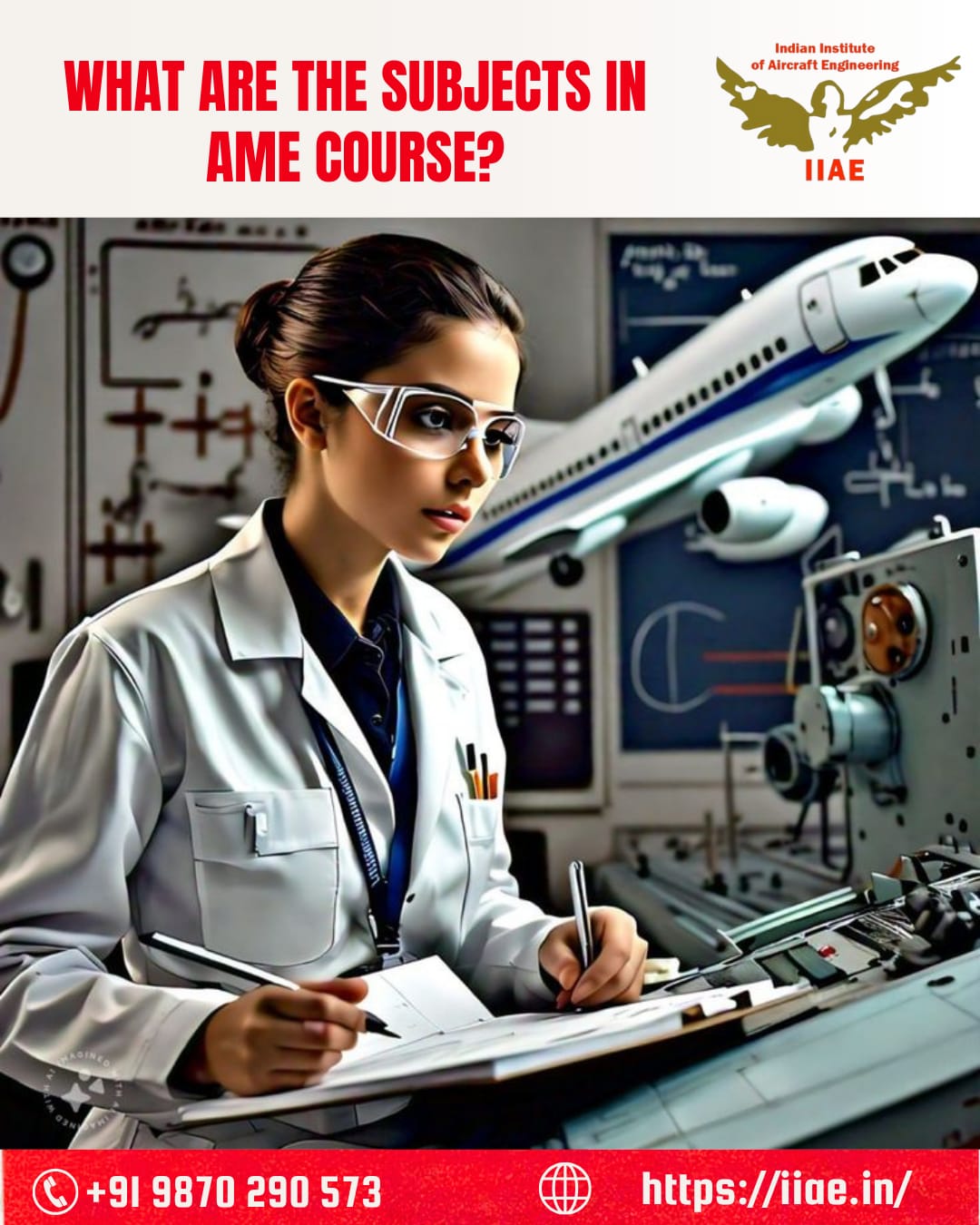Why Knowing Subjects in AME Course Is Crucial for Your Aviation Career
The Aircraft Maintenance Engineering (AME) course is a specialized aviation program that prepares students for a dynamic career in aircraft safety, repair, and maintenance. If you’re a 12th science student dreaming of working in the aviation sector, understanding the subjects in the AME course is the first step to mapping your career path.
This blog will give you an in-depth breakdown of the
AME course curriculum, including core topics, modules, and licensing tracks (Mechanical & Avionics). Whether you’re curious about the syllabus, looking for eligibility criteria, or comparing
DGCA-approved AME institutes, this guide has you covered.
Overview of AME Course Curriculum
What Is the AME Course?
-
A licensed training program approved by the Directorate General of Civil Aviation (DGCA)
-
Divided into two streams:
-
Mechanical (Aeroplane & Jet Engine)
-
Avionics (Electrical, Instrument, and Radio Navigation Systems)
-
Duration: 2 years academic + 2 years practical training
Why Knowing AME Subjects Matters
-
Helps students align interests with specialization
-
Prepares for DGCA module exams
-
Builds strong fundamentals in aircraft systems
Core Subjects in AME Course: Year-wise Breakdown
First Year Subjects – Foundation Building
The first year focuses on theoretical foundations essential for all streams:
| Subject Name |
Description |
| Mathematics |
Applied math in aircraft systems |
| Physics |
Forces, motion, electricity, and thermodynamics |
| Basic Aerodynamics |
Study of airfoil, lift, drag, thrust |
| Aircraft Rules & Regulations |
CARs (Civil Aviation Requirements) by DGCA |
| Human Factors |
Pilot-maintenance interface and error management |
| Electrical Fundamentals |
Aircraft electrical systems and safety |
| Material and Hardware |
Aircraft-grade metals, fasteners, and bonding techniques |
| Maintenance Practices |
Tools, documentation, and maintenance protocols |
🔍 Key Takeaways from Year 1
-
Strong focus on DGCA Module Exams 1–8
-
Emphasis on theory + lab work
-
Prepares students for workshop practices
✈️ Second Year Subjects – Stream Specialization
🛠️ Mechanical Stream Subjects:
| Module Code |
Subject |
Topics Covered |
| 11 |
Aerodynamics, Structures, Systems |
Aircraft structure, flight control systems |
| 15 |
Gas Turbine Engines |
Jet propulsion, engine construction |
| 16 |
Piston Engines |
Combustion engines, lubrication, cooling |
| 17 |
Propellers |
Propeller theory, maintenance, balancing |
Skills Developed in Mechanical Stream
💡 Avionics Stream Subjects:
| Module Code |
Subject |
Topics Covered |
| 11 |
Aerodynamics, Structures, Systems |
General systems knowledge |
| 13 |
Aircraft Instrument Systems |
Pressure, gyroscopic, and electronic instruments |
| 14 |
Electrical and Electronic Systems |
Wiring, components, control circuits |
| 15 |
Radio Navigation & Communication |
VOR, ILS, ADF, VHF/UHF radios |
Skills Developed in Avionics Stream
-
Troubleshooting electronic systems
-
Working with navigational aids
-
Ensuring signal integrity
AME DGCA Module Exam Structure
The AME Course is aligned with DGCA module exams. Each subject corresponds to a module number defined by DGCA. Students must pass these to earn a license.
Table of DGCA Modules vs. Subject Topics
| Module No. |
Subject |
Stream |
| 1 |
Mathematics |
Both |
| 2 |
Physics |
Both |
| 3 |
Electrical Fundamentals |
Both |
| 4 |
Electronic Fundamentals |
Avionics |
| 5 |
Digital Techniques / Instrument Systems |
Avionics |
| 6 |
Materials and Hardware |
Both |
| 7 |
Maintenance Practices |
Both |
| 8 |
Basic Aerodynamics |
Both |
| 9 |
Human Factors |
Both |
| 10 |
Aviation Legislation |
Both |
| 11 |
Aircraft Aerodynamics and Structures |
Both |
| 12 |
Helicopter Theory |
Optional |
| 13–17 |
Specialization Modules (Engines, Systems) |
Stream-wise |
Subjects by Licensing Category – B1 vs. B2 Comparison
Category B1.1 (Mechanical – Aeroplane Turbine)
Includes modules related to airframe, gas turbine engine, maintenance, and basic electricals.
Category B2 (Avionics)
Focuses more on electrical, instrument, and radio navigation systems.
Comparison Table
| Category |
Focus Area |
Key Modules |
| B1.1 |
Engines + Aircraft Structure |
11, 15, 16, 17 |
| B2 |
Electrical + Instrumentation |
4, 5, 13, 14, 15 |
Practical Training Subjects & Workshop Exposure
In the second phase (on-the-job training), students get hands-on experience with:
-
Aircraft engine disassembly and assembly
-
Defect rectification tasks
-
Instrument system calibration
-
Use of AMM (Aircraft Maintenance Manual)
Key Practical Areas
FAQs about Subjects in AME Course
Q1: Are math and physics compulsory for AME Course?
Yes. These are foundational subjects in the first year and part of DGCA Module Exams.
Q2: Can I choose AME subjects based on interest?
Partially. In the second year, you select a stream (Mechanical or Avionics) based on your preference.
Q3: How many modules are there in total?
There are 17 DGCA Modules, out of which students need to pass stream-relevant ones to earn a license.
Q4: Is the syllabus same for all AME colleges?
The core syllabus is standardized by DGCA, but practical exposure may vary by institution.
Q5: Which stream has better career scope: Mechanical or Avionics?
Both have excellent scope. Mechanical is hands-on with engines, while Avionics deals with high-tech systems. Choose based on your interests.
Conclusion: Your Future in Aviation Starts with AME Subjects
The
subjects in the AME course are designed to shape technically skilled professionals capable of handling high-responsibility tasks in aircraft maintenance and safety. From theoretical foundations in aerodynamics and electrical systems to specialized modules in engines and avionics, each subject builds toward your goal of becoming a licensed
Aircraft Maintenance Engineer.
Choosing the right stream and understanding the syllabus thoroughly will give you a solid advantage. If you’re passionate about aircraft, technology, and safety, the AME course could be your ticket to a successful aviation career.
